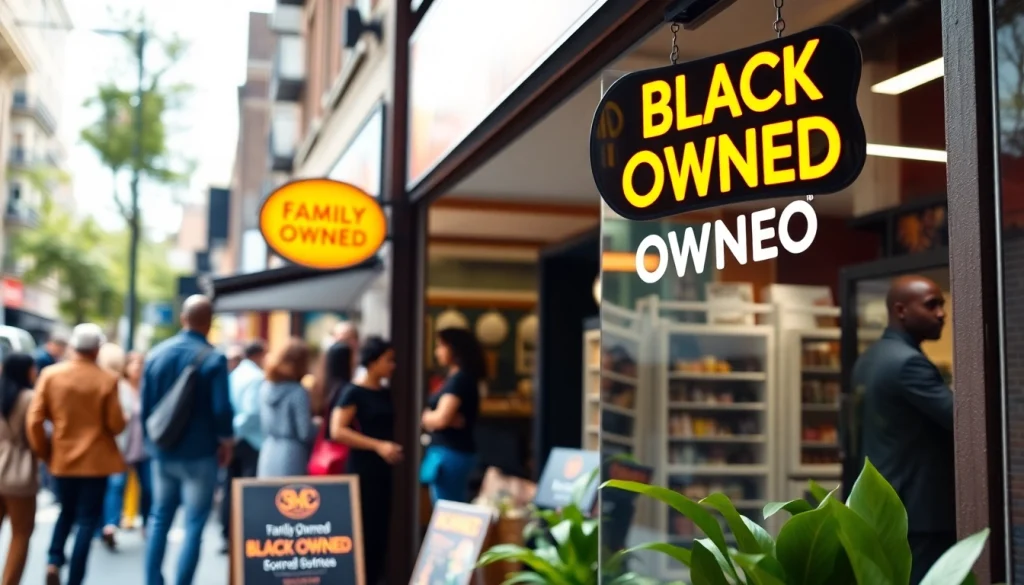
Understanding the Importance of Family Owned and Black Owned Businesses
In an increasingly globalized market, the significance of family owned and black owned businesses has become more pronounced. These enterprises are not merely economic entities; they are stewards of culture, tradition, and community values. They create a tapestry of diverse influences and contribute significantly to the economy, local demographics, and social fabric.
The Historical Context of Black Ownership
The journey of black ownership in America is steeped in rich history, marked by both triumphs and challenges. From the establishment of freedmen’s towns in the post-Civil War era to the significant rise of black entrepreneurship during the 20th century, black-owned businesses have played a vital role in shaping community structures. They have often served as bastions of hope in the face of systemic barriers, offering not only goods and services but also employment opportunities that empower individuals and families.
Benefits of Supporting Family Businesses
Family-owned businesses are often characterized by intertwined values and personal commitment. These businesses tend to reinvest profits back into the community and the family unit. By supporting them, consumers help to break cycles of poverty, promote job creation, and foster community resilience. They also tend to be more adaptable as they are less driven by profit margins and more focused on long-term sustainability.
Community Impact and Economic Growth
Research has shown that local family and black-owned businesses are instrumental in driving economic growth. They contribute to job creation, often employing local residents who reinvest their earnings back into the community. When families own businesses, they lay the groundwork for future generations, helping to build wealth and financial literacy among underserved populations. This creates a ripple effect, enhancing the overall socio-economic landscape.
Challenges Faced by Family Owned and Black Owned Businesses
Access to Capital and Funding Resources
Despite their importance, family-owned and black-owned businesses frequently encounter substantial hurdles in accessing capital and funding. Many financial institutions have historically favored established businesses with proven track records, thereby sidelining newer enterprises. This disparity can make it challenging for these businesses to secure necessary startup funds, affecting their growth and sustainability.
Marketing and Visibility Barriers
Marketing is another area where family-owned and black-owned businesses can struggle. Without robust marketing strategies, many remain invisible to potential customers. Additionally, the advent of digital marketing has left some traditional business owners behind due to a lack of resources or knowledge. This limitation can hinder their ability to reach broader markets and increase sales.
Networking and Support Systems
Effective networking is crucial for business success; however, many family-owned and black-owned enterprises find themselves isolated. This lack of support can inhibit their growth and development. Building a robust support system encompassing mentorship, community organizations, and business associations is essential. These networks can offer insights, share best practices, and create opportunities for collaborative growth.
Ways to Support Family Owned and Black Owned Businesses
Shopping Locally and Online
One of the most straightforward ways to support family-owned and black-owned businesses is to shop locally and online. Consumers can make a conscious effort to choose local goods, services, and online platforms that support these enterprises. By doing this, individuals contribute directly to the economic health of their communities.
Advocacy and Awareness Campaigns
Engaging in advocacy and awareness campaigns is critical for elevating the voices of these businesses. Creating social media campaigns, hosting community events, or writing informative blogs can help raise awareness and educate the public about the importance of support. Larger organizations can partner with local enterprises to amplify their reach and forge new opportunities.
Building Community Networks
Building community networks is essential for fostering an environment where family-owned and black-owned businesses can thrive. Local chambers of commerce, business associations, and networking events are excellent platforms to initiate connections. By creating collaborative efforts, these businesses can pool resources, share success stories, and mentor new entrepreneurs, thus forging a united front amidst challenges.
Successful Case Studies of Family Owned and Black Owned Businesses
Profile of Notable Local Businesses
A closer look at successful family-owned and black-owned businesses often reveals the heart and soul at the core of the community. Entrepreneurs such as those running local restaurants, retail shops, and service providers have not only achieved financial success but also contributed significantly to cultural preservation and community engagement.
Innovative Marketing Strategies
Successful businesses often employ innovative marketing strategies that leverage both technology and community engagement. Social media storytelling, local influencer partnerships, and grassroots marketing tactics are frequently used. By utilizing customer testimonials, creating relatable content, and engaging with their audiences, these businesses can build strong brand loyalty while also attracting new customers.
Community Engagement Examples
Community engagement plays a pivotal role in the success of family-owned and black-owned businesses. Many of these enterprises place a strong emphasis on involvement in community events, sponsorships, and collaborative projects. Their unique understanding of local needs and aspirations allows them to connect authentically with their customer base while contributing to community development.
The Future of Family Owned and Black Owned Enterprises
Trends in Entrepreneurship
The landscape of entrepreneurship is continuously evolving, and family-owned and black-owned businesses are at the cusp of significant trends. From focusing on eco-sustainability to leveraging technology for efficiency, these enterprises are adapting to meet the changing demands of consumers. Emerging trends also show a shift towards social entrepreneurship, where profits are used to address social issues.
Policy Changes and Support
In recent years, there has been a push for policy changes to support family-owned and black-owned businesses, particularly in areas of financing and regulatory relief. Government incentives and grant programs are being implemented to provide necessary resources for these enterprises to flourish. Increased advocacy and visibility are critical in solidifying these changes to ensure long-lasting benefits.
Building a Sustainable Business Model
As we look toward the future, building a sustainable business model emerges as a significant focus for family-owned and black-owned businesses. This includes not only financial sustainability but also social and environmental responsibility. Businesses that can successfully integrate sustainability into their operations and maintain a balanced livelihood philosophy are likely to gain a competitive advantage in the marketplace.




